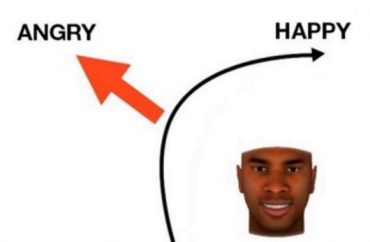
A new study put out by New York University researchers essentially claims to show that white people are subconsciously biased and can’t help but make snap decisions about others based on stereotypes.
The psychology study conducted the research by tracking test subjects’ hand movements on a computer mouse. Test subjects were asked to make split decisions about pictures of people of various races depicting different emotions. Using mouse-tracking software, the NYU neuroscientists argue millimeters of movement of a test subject’s mouse shows people have latent biases that influence how they perceive others.
“For example, the extent to which a subject’s hand initially veered toward the ‘angry’ response when categorizing a non-angry Black male face predicted the extent to which neural-activation patterns for Black male faces and angry faces were more strongly correlated in the subject’s fusiform cortex,” an NYU release summarizing the study stated. “[M]en, and particularly Black men, were initially perceived ‘angry,’ even when their faces were not objectively angry.”
Of the 46 test subjects, nearly all of them were white males and females — and none were black — according to the specifics of the study recently published in Nature Neuroscience. So in effect, the research found white people tend to quickly stereotype black people as hostile even if they might not endorse this view.
Other notable findings include that “women were initially perceived ‘happy,’ even when their faces were not objectively happy,” the release states. “In addition, Asian faces were initially perceived ‘female’ and Black faces were initially perceived ‘male,’ regardless of the faces’ actual gender. The researchers confirmed, using a separate group of subjects, that the specific pattern of visual biases observed matched prevalent stereotypical associations in the U.S. to a significant degree.”
MORE: Professor defends stereotypes — says many are accurate
“Despite their conscious responses, the subjects’ hand movements revealed the presence of several stereotypical biases,” the release notes.
Assistant professor of psychology Jonathan Freeman, senior author of the paper, did not respond to emailed requests seeking comment and clarification from The College Fix. His faculty profile notes he specializes in “split-second social perception—how we use facial cues to instantly categorize other people into social groups (e.g., gender and race) and perceive their personality traits and emotion.”
NYU’s Deputy Director of Media Relations James Devitt told The College Fix via email that “the mousetracking technique simply gauges people’s perceptions in the same way a public opinion survey would, but in a way that more accurately captures their true sentiments.”
The study concludes that “stereotypes we hold can influence our brain’s visual system, prompting us to see others’ faces in ways that conform to these stereotypes,” the release states.
Ryan Stolier, an NYU doctoral student and lead author of the research, added that “our findings therefore shed light upon an important and perhaps unanticipated route through which unintended bias may influence interpersonal behavior.”
The research was supported in part by a $525,000 grant from the National Science Foundation.
MORE: ‘Negative Stereotypes’ Influence Minorities To Get Fat
Like The College Fix on Facebook / Follow us on Twitter
College Fix contributor Seth Ian is a YU graduate living in New York City and pursuing his master’s in education.
IMAGE: NYU screenshot





Please join the conversation about our stories on Facebook, Twitter, Instagram, Reddit, MeWe, Rumble, Gab, Minds and Gettr.